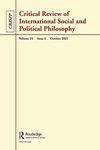两极化时代中提升信任的实证视角
IF 0.9
Q3 POLITICAL SCIENCE
Critical Review of International Social and Political Philosophy
Pub Date : 2023-03-01
DOI:10.1080/13698230.2023.2183598
引用次数: 0
摘要
Vallier对社会信任与政治两极分化的实证文献的分析是将实证结果整合到政治哲学中的一次令人钦佩的尝试。尽管如此,它可能还不足以解释什么是问题,什么不是问题。对日益加剧的政治两极分化的普遍理解并没有充分区分这一说法的各种含义,而这种区分可能有助于推进Vallier的理论。在这篇简短的文章中,我概述了两个领域,可以有效地纳入他的论点。本文章由计算机程序翻译,如有差异,请以英文原文为准。
An empirical perspective on improving trust in a polarized age
ABSTRACT Vallier’s analysis of the empirical literature on social trust and political polarization is an admirable attempt to integrate empirical findings into political philosophy. Nonetheless, it may not go far enough toward explicating what is and what is not the problem. The popular understanding of increasing political polarization does not distinguish adequately between various meanings of this claim, distinctions that might have helped to advance Vallier’s theory. In this brief essay I outline two areas that could be usefully incorporated into his arguments.
求助全文
通过发布文献求助,成功后即可免费获取论文全文。
去求助
来源期刊

Critical Review of International Social and Political Philosophy
POLITICAL SCIENCE-
CiteScore
1.60
自引率
0.00%
发文量
74
 求助内容:
求助内容: 应助结果提醒方式:
应助结果提醒方式:


